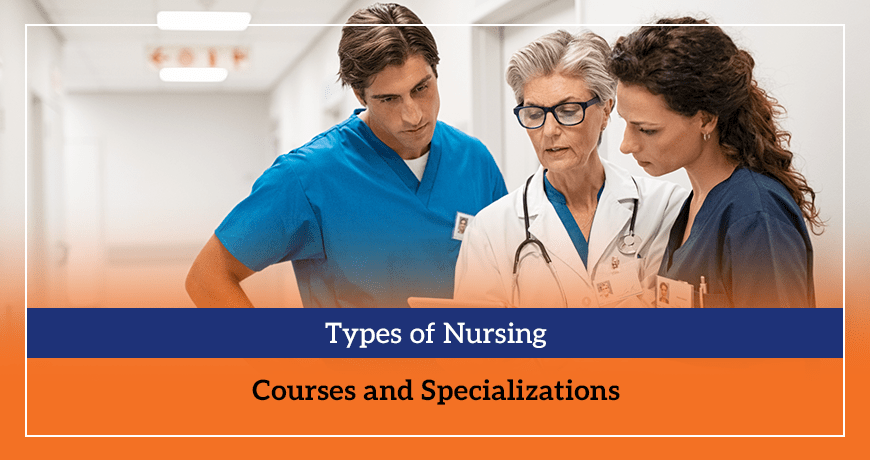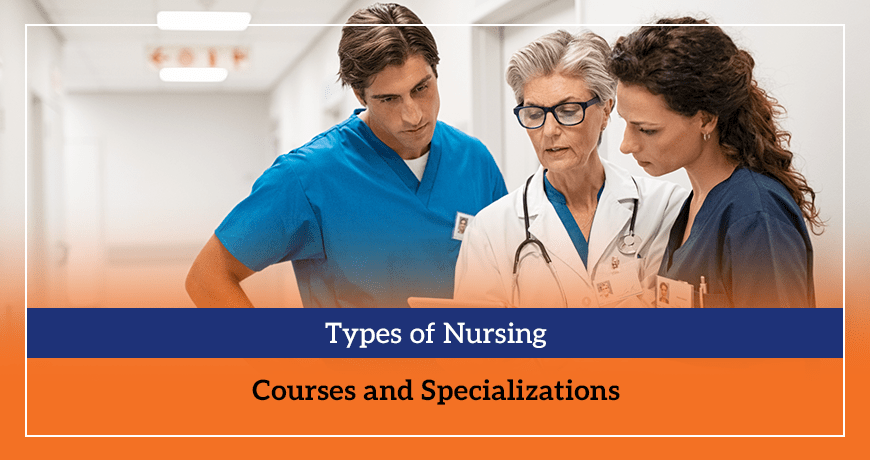Are you considering a career in nursing? The United Kingdom (UK) is one of the most attractive destinations for aspiring nurses, offering world-class universities, advanced nursing programs, and a robust healthcare system.
Enrolling in Nursing Courses in the UK for International Students means gaining high-quality academic training along with hands-on clinical practice within the National Health Service (NHS) and other healthcare institutions.
This guide will provide you with essential insights into admission requirements, course options, and career opportunities, helping you plan a successful pathway toward a fulfilling nursing career in the UK.
Overview of Nursing Education in the UK
The UK education system offers a clear pathway to becoming a registered nurse. You'll find different programs catering to your goals and learning pace there. Here's a quick breakdown of the three main structures you'll find:
Bachelor of Science (BSc) Degree in Nursing
This is the most popular choice and a comprehensive nursing career foundation. It's a four-year journey (for the full-timer) where you'll explore all aspects of nursing. You'll learn the theoretical underpinnings of patient care – the "why" behind what nurses do. You'll also gain hands-on experience through practical skills training.
Master of Science (MSc) Degree in Nursing
This is an advanced program for registered nurses who want to specialise in a specific area. You've already got the basic nursing knowledge and skills under your belt. Now, you want to become an expert in a particular field.
An MSc program typically takes one to two years of full-time study to deepen your knowledge and skills in your chosen speciality.
Diploma in Nursing
Besides a B.Sc., there is also the option of a Diploma in Nursing in the UK. This more focused program is to get you qualified faster. Usually, it takes 18 months to two years of full-time study. It equips you with the core competencies needed to work in a specific area of nursing.
Ensuring Quality: Accreditation by the NMC
Whatever program you choose, ensuring it's accredited by the NMC (Nursing and Midwifery Council) is very important. The NMC oversees all nursing courses in the UK. They make sure that each program meets high standards of education and training. This ensures that once you graduate, you're fully prepared and qualified to work as a nurse in the UK.

Types of Nursing Courses and Specialisations
In the UK, nursing students can choose from several types of nursing courses and specialisations. For example:
Adult Nursing
This field focuses on caring for adult patients, from young adults to the elderly. You'll learn how to look after adult individuals with different health problems, emotionally and psychologically. This specialisation works in various settings, including hospitals, clinics, and community health centres.
Children's Nursing
Also known as pediatric nursing, this area specialises in caring for babies, children, and teenagers. You'll learn how to handle the unique health needs of young patients and support their families. Children's nurses work in places like children's hospitals, pediatric wards, and community health services.
Mental Health Nursing
This specialisation is all about helping people with mental health issues. You'll learn how to support patients dealing with conditions like depression, anxiety, and schizophrenia. Mental health nurses work in hospitals, mental health clinics, and community centres, providing therapy, medication management, and emotional support.
Learning Disability Nursing
Nurses in this field support people with learning disabilities. You'll learn how to help patients develop skills for everyday living, promote their independence, and improve their quality of life.
Nursing Associate
This is a new role in the nursing field. Nursing associates support registered nurses and provide care for patients. This role requires less training than a full nursing degree, but it still provides valuable knowledge in healthcare.
Dual Field Degrees and Specialised Diploma Courses
If you're interested in more than one area of nursing, you can choose a dual-field degree. This means you study two specialisations at the same time. For example, Adult and Mental Health Nursing or Children's and Learning Disability Nursing. These programs typically take around four years to complete.
There are also specialised diploma Courses. These are shorter courses that focus on specific areas of nursing. For example, you might take a diploma in pediatric nursing or mental health nursing.

Duration and Structure of Nursing Programs
Nursing programs in the UK come in different formats to fit your needs. Here's a simple guide to how long each type of program takes:
Full-time Study
- BSc Nursing: This full-time program usually takes 3 to 4 years to complete.
- MSc Nursing: A full-time MSc program typically takes 1 to 2 years.
Accelerated and Part-time Options
- Accelerated Nursing Programs: An accelerated BSc can be done in about 2 years, and an MSc may take as little as 18 months.
- Part-time Study: Part-time programs often take 4-6 years for a BSc and 2-4 years for an MSc. It depends on how many hours you study each week.
Admission Requirements for International Students
To study nursing in the UK, international students must meet specific requirements:
- Academic qualifications: Equivalent to UK A-levels or a relevant bachelor's degree.
- Language proficiency: Usually, an IELTS score of 7.0 overall, with no less than 6.5 in any component.
Specific qualifications vary by country, so check the university's requirements.
Tuition Fees and Financial Aid
Studying nursing in the UK can cost a lot for students from other countries. The fees for nursing courses can vary. On average, international students might pay between £20,000 and £35,000 every year for their studies.
But there are ways to get help with the money. Some universities offer scholarships for nursing students. These scholarships can help cover some or all of the fees. Additionally, some students may be eligible for loans or grants from their home countries to assist with the cost of their studies in the UK.

Top Nursing Colleges in the UK
Here's a table with some of the top nursing schools in the UK for international students, including their QS World University Rankings subject-wise:
|
Name
|
QS World University Rankings (Nursing)
|
Fees/Year (Approx)
|
Available Program
|
Employer Reputation (%)
|
|
King's College London
|
2
|
£34,786
|
B.Sc., M.Sc
|
97
|
|
University of Manchester
|
6
|
£29,000
|
B.Sc., M.Sc
|
88.3
|
|
University of Southampton
|
11
|
£22,000
|
B.Sc., M.Sc
|
69.6
|
|
University of Leeds
|
38
|
£30,250
|
B.Sc., M.Sc
|
76.6
|
|
University of Nottingham
|
38
|
£28,600
|
B.Sc., M.Sc
|
64.5
|
|
University of Edinburgh
|
42
|
£34,800
|
B.Sc., M.Sc
|
78.7
|
King's College London
King's College London is a top university for nursing. The university has excellent teaching hospitals where nursing students receive their education. The Nursing with Registration as an Adult Nurse BSc course teaches evidence-based care and research. The BSc program lasts 3 to 4 years.
Eligibility:
- Good grades in science subjects, such as Biology, Physics, Chemistry, and Psychology, are preferred.
- English language: Need English language band: B.
Intake Dates: The program begins in September, and the application deadline is typically in January.
Scholarships: There's a scholarship called King's Scholars of Tomorrow for nursing students.
University of Manchester
The University of Manchester offers a three-year nursing program. It provides practical experience in different areas of healthcare. Students can get an integrated master's qualification.
Eligibility:
- Students need A-level qualifications with grades BBC.
- English skills should be good, with an IELTS score of 7.0.
Intake Dates: Applications open in September.
Scholarships: There's a scholarship called the Global Futures Scholarship for international students.
University of Southampton
The University of Southampton is one of the best nursing schools in the UK for international students and is recognised globally for its nursing programs, offering BSc and MSc degrees. The BSc program typically lasts 3 to 4 years. The MSc program, focusing on advanced study, takes around 1 to 2 years.
Eligibility:
- Academic qualifications equivalent to UK A-levels.
- English language proficiency is required, usually requiring an IELTS score of 7.0 or higher.
Intake Dates: Usually begin in September, though January intake may also be available.
Scholarships: Information on scholarships for nursing students can be found on the university's website.
University of Leeds
The University of Leeds is another prominent university that offers nursing courses. Students can benefit from access to exceptional clinical skills facilities. The program maintains a balanced 50:50 ratio between academic study and clinical placements.
Eligibility:
- A-level grades of BBB are preferred
- Have at least one of the subjects: Applied Science, Biology, Chemistry, Physics, or Psychology.
- Overall, the IELTS score must be 7, with no component scoring less than that.
Intake Dates: Application starts from the first week of September. The UCAS application deadline for all medicine, dentistry, and veterinary medicine/science programs is October.
Scholarships: There are no scholarships available for this course.
University of Edinburgh
The University of Edinburgh's nursing program prepares students for different healthcare jobs. The program lasts 3 to 4 years for BN. It teaches critical thinking and teamwork skills.
Eligibility:
- Students need A-levels, but no specific subjects are required.
- They should have an IELTS score of 7.0.
Intake Dates: Applications start on 1st September (usually).
Scholarships: There are no scholarships for BN Nursing Studies.
University of Nottingham
The University of Nottingham offers one of the best nursing courses in the UK. Their program guarantees Nursing and Midwifery Council (NMC) registration and focuses on leadership skills.
Program Details:
- Duration: BSc Hons is £28,600 per year.
- It encompasses three decades of training experience and a strong track record in teaching and research.
Eligibility:
- IB Score: 30 with three subjects at a Higher Level
- A Higher Level 5 in a science subject
- IELTS score: 7.0 in reading, listening, and speaking, and 6.5 in writing.
Intake Dates: Applications typically commence in the first week of September.
Scholarships: Students can apply for the Undergraduate Excellence Awards.
Top Nursing Courses in the UK for International Students
Discover various nursing programs available at universities in the UK, designed especially for international students. These programs offer a mix of academic learning and hands-on training. Below is a detailed table with important information about these courses.
| University |
Course Name |
Degree Level |
Duration |
Tuition Fees (Intl.) |
Funding/ Scholarships |
Entry Requirements |
Key Features |
| Anglia Ruskin University |
BSc (Hons) International Nursing |
Undergraduate |
3 years |
£15,300 per year |
Various scholarships available |
IELTS 6.5, High School Diploma |
Focus on global perspectives in healthcare, practical placements |
| Swansea University |
BSc (Hons) Adult Nursing |
Undergraduate |
3 years |
£18,000 per year |
Welsh Government bursary |
IELTS 7.0, High School Diploma |
Emphasis on core nursing values, practical experience, and post-graduation employment with NHS Wales |
| Coventry University |
BSc (Hons) Nursing Studies Top-up |
Undergraduate Top-up |
1 year |
£13,900 per year |
Various scholarships available |
Registered Nurse qualification, IELTS 6.5 |
Top-up degree for existing nurses, with a focus on public health and pain management |
| University of East London |
BSc (Hons) Nursing (Adult) |
Undergraduate |
3 years |
£14,700 per year |
Government loans, UEL scholarships |
IELTS 6.5, High School Diploma |
Comprehensive support, practical placements, supplementary grants |
| University of Bradford |
MSc International Nursing Studies |
Postgraduate |
1 year |
£24,180 per year |
Scholarships and bursaries are available |
Registered Nurse qualification, IELTS 6.5 |
Advanced nursing practices, flexible learning approaches, blended learning |
| University of Hertfordshire |
MSc Adult Nursing |
Postgraduate |
2 years |
£17,950 per year |
NHS funding for UK/EU students |
IELTS 7.0, Relevant Bachelor's Degree |
Inter-professional education, clinical decision-making modules, and diverse placement opportunities |
| Cardiff University |
BN Adult Nursing |
Undergraduate |
3 years |
£18,450 per year |
Welsh Government bursary |
IELTS 7.0, High School Diploma |
Subsidised tuition, 2 years of paid NHS Wales employment post-graduation |
| University of Manchester |
BNurs Adult Nursing |
Undergraduate |
3 years |
£25,000 per year |
Various scholarships available |
IELTS 7.0, High School Diploma |
Emphasis on leadership, advanced clinical skills, and extensive practical placements |
| University of Plymouth |
MSc Pre-registration Nursing (Adult) |
Postgraduate |
2 years |
£19,000 per year |
Various scholarships available |
IELTS 7.0, Relevant Bachelor's Degree |
Support for non-UK educated students, practical placements, and focus on adult health nursing |
| Teesside University |
BSc (Hons) Nursing |
Undergraduate |
3 years |
£13,000 per year |
Scholarships available |
IELTS 6.0, High School Diploma |
Evidence-based practice, extensive practical and clinical skills training |
| University of Greenwich |
BSc (Hons) Adult Nursing |
Undergraduate |
3 years |
£15,100 per year |
Scholarships available |
IELTS 6.5, High School Diploma |
Diverse placement opportunities, emphasis on student-led placements and clinical experience |
| University of Liverpool |
BN (Hons) Nursing |
Undergraduate |
3 years |
£18,100 per year |
Various scholarships available |
IELTS 7.0, High School Diploma |
Focus on advanced clinical needs, dissertation in third year, extensive use of clinical skills labs and resources. |

Career Opportunities and Job Market in the UK
In the UK, job opportunities for nurses are huge. More than 10% of online job openings were in the healthcare industry, compared to any other industry. Nearly 90% of local authorities reported a need for healthcare workers.
After finishing their studies, nursing graduates usually find jobs quickly. Nurses in the UK get paid well for their work. They can earn between £25,000 and £44,000 annually, depending on their experience and where they work.
Visa and Work Permit Guidelines
International students who want to study nursing in the UK need to get a student visa. This means they must demonstrate acceptance into a nursing program, sufficient financial resources to cover their studies, and a sufficient level of English proficiency.
After finishing their studies, international students might be able to stay and work in the UK for a while. There are different visa options for working after studying. Students need to understand the visa rules and consult with their university or immigration advisors for assistance.
Preparing for the UK Nursing Profession
Preparing to become a nurse in the UK involves understanding the process and meeting certain requirements. Here's a quick guide for you:
- Choose Your Nursing Field: There are different types of nursing courses you can do, as we mentioned earlier. You can also study more than one type of nursing.
- Check What You Need: You'll need certain qualifications and requirements to study nursing.
- Find the Right University: Look for universities that offer nursing courses. Some courses are for people who already have a degree and want to study nursing.
- Apply to Universities: Once you find a course you like, apply for nursing courses in the UK through UCAS.
- Complete NMC Registration: Once you've completed your nursing program, you'll need to apply for registration with the NMC.
- Meet Work Requirements: After obtaining NMC registration, you need to be a registered nurse in the UK. Ensure you meet any additional work requirements set by your employer or healthcare facility.

Frequently Asked Questions
What are the cheapest nursing schools in UK for international students?
Schools like the University of Hull and the University of Sunderland offer affordable programs.
How much does a nursing degree cost in the UK for international students?
Costs range from £15,000 to £40,000 per year, depending on the program.
Are there 6-month nursing courses in the UK for international students?
6-month courses are rare; most programs are longer to meet NMC standards.
Can I pursue a 2-year nursing degree in the UK as an international student?
Yes, there are 2-year accelerated nursing programs available, especially at the MSc level.
What is an accelerated nursing program in the UK?
These programs enable students with relevant qualifications to complete their nursing degree more quickly. Usually, you'll need 18 months to 2 years to complete it.
Conclusion
Pursuing Nursing Courses in the UK for International Students is one of the best choices for those seeking a secure and rewarding future in healthcare. With globally recognised universities, diverse specialisations, and practical training opportunities within the National Health Service (NHS), nursing graduates enjoy some of the highest employability rates worldwide.
By preparing early and choosing the right course, you can unlock excellent career prospects and become part of a respected profession that makes a real difference in people’s lives. Your journey toward a meaningful career in nursing can start today in the UK.